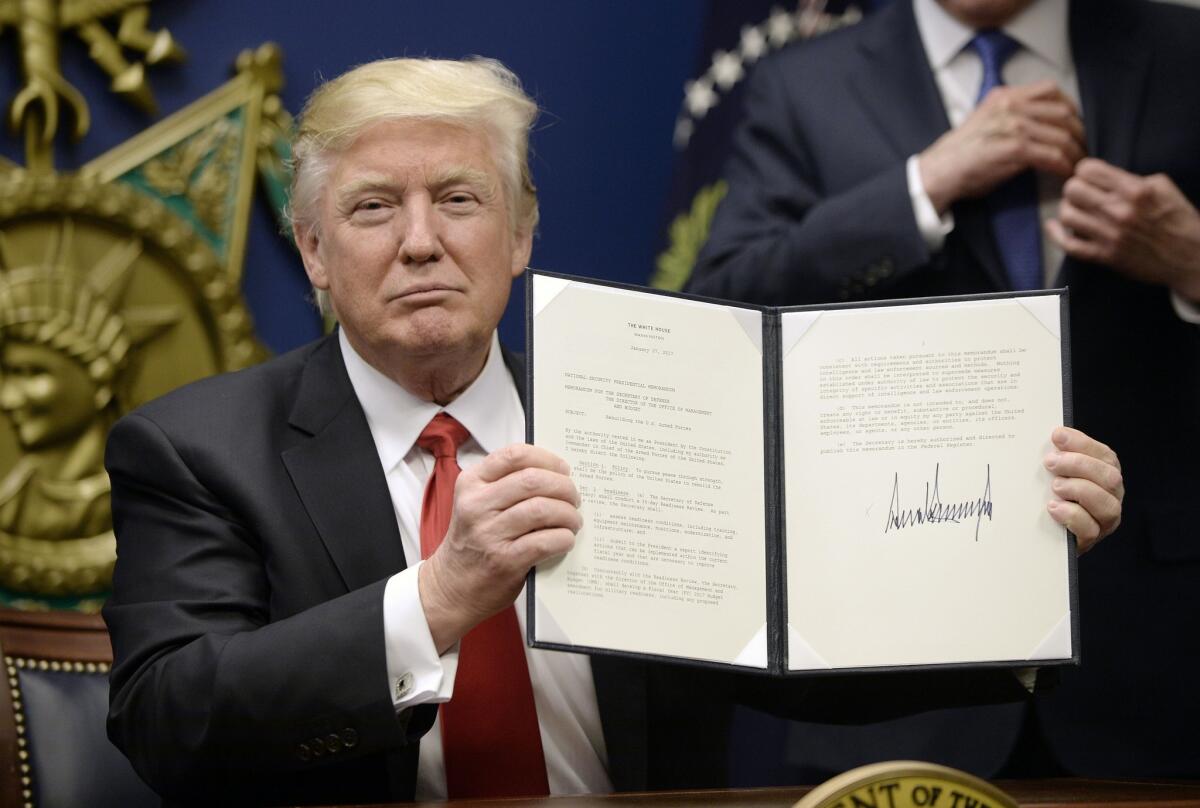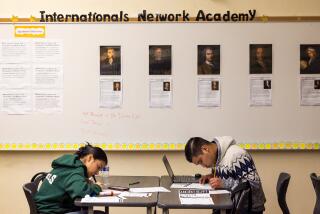Trump’s travel ban leaves global businesses and entrepreneurs hanging

When Silicon Valley entrepreneur Sasha Eslami boarded a flight to Argentina on Thursday for a business trip, he had no idea that by the next day, the United States — a country he had called home for the last 14 years — would close its borders to him.
“I was only planning on being in Argentina for two months to do recruitment,” said Eslami, 28, an Iranian citizen and U.S. permanent resident who fears that he won’t be able to return from Buenos Aires because of President Trump’s controversial executive order blocking U.S. entry to refugees and nationals of seven Muslim-majority countries.
“I have a start-up in San Francisco. I have a house in San Jose with all my stuff. I need to be in the U.S.,” he said.
For all Trump’s campaigning about how his business acumen would boost the economy and help entrepreneurs, company founders such as Eslami were quick to point to the chaos that Friday’s executive order has created for them.
In Eslami’s case, he has found himself stranded overseas away from his business. The Department of Homeland Security said Sunday that green card holders from the seven Muslim-majority countries affected by the order would be able to reenter the country, but the rushed implementation has left many with a sense of uncertainty about whether they will be turned away at the border.
Some companies have postponed business trips for visa-carrying employees. Sports leagues with foreign-born players and global corporations with established American outposts now face a conundrum of what to do with employees whose jobs require them to cross borders.
“I have clients [from the listed countries] who are on investor visas wondering if they can come back to manage their investments, and the answer is no,” said Reaz Jafri, an immigration attorney at Withers Bergman who spent the weekend fielding panicked calls from corporate clients.
“Some of these companies are multinational firms. They can’t bring in people from overseas. They can’t let people in the U.S. leave. It’s going to have an immediate financial effect.”
Businesses are scrambling to change longstanding plans. In the Bay Area, Alston Ghafourifar and his sister Brienne run Entefy, a tech start-up whose employees include citizens of the affected countries. The firm quickly altered travel plans to account for employees who might not be able to leave the country without risk of their reentry being denied.
“It doesn’t halt our business operations, but it makes it much harder,” said Ghafourifar, whose employees travel to attend tech conferences, meet international investors and visit team members abroad. “It forces us to re-plan what our next two quarters will look like.”
Some executives, like Husayn Kassai, chief executive of British background check start-up Onfido, find irony in how an administration that pledged on the campaign trail to help create jobs may wind up doing the exact opposite.
Kassai, a British and Iranian dual citizen who holds a green card, travels between his firm’s London and San Francisco offices every three weeks for meetings and recruitment. The start-up is growing and plans to hire more U.S. workers, but now he questions whether he should travel at all.
Not being able to meet in person can hinder productivity and relationship building. Recruitment can suffer if executives are absent, Kassai said, and in an already competitive industry where firms are vying for talent, he can’t afford to not be in the room when offers are made.
While much of his job can be done over Skype, Kassai said nothing beats in-person communication. “If I’m there in person, we might be better at persuading [a candidate] to join.”
Trump’s order also rattled the sports business world.
Although the order is temporary, several media reports questioned whether it might harm Los Angeles’ bid to host the 2024 Summer Olympics were it to continue to affect global athletes’ ability to enter and leave the country.
There also was speculation that it could impede two players in the National Basketball Assn. who are citizens of South Sudan, which gained its independence in 2011.
The situation prompted the NBA to seek more clarity from the U.S. State Department so that the league can “understand how this executive order would apply to players in our league who are from one of the impacted countries,” NBA spokesman Mike Bass said in a statement.
Many business experts fear that even a 90-day ban could have long-term consequences for the U.S. economy.
“It sends a global message,” said Thomas Cooke, a professor at Georgetown’s McDonough School of Business, “that America is not a good place for doing business.”
And brain drain is entirely possible, Cooke said. Engineers, scientists, doctors and researchers may well take their work to countries that are less openly hostile toward immigration.
Even in Silicon Valley, long seen as the mecca for software engineers, some foreign-born workers have started to question whether it’s worth jumping over immigration hurdles to stay.
Soroush Pour, a software engineer who is a citizen of Iran and Australia and has lived in the U.S for seven years on a visa, booked a trip to visit Australia in February to attend a wedding. Over the weekend, he was advised by immigration attorneys to avoid traveling outside the U.S.
“I love the company I work for, and I love living in the Bay Area, but it’s hard for me to go through this visa process, and it’ll take years before I have permanent residency, let alone citizenship,” Pour said. “It makes you wonder if this will ever be home.”
For Eslami, who remains in Argentina, the U.S. is home. He’s lived here for more than half his life. He wants to get back to his business, to his employees, to his life in the Bay Area.
“Right now I’m just waiting to see how this thing plays out,” he said. “It’s too early to judge what will happen.”
Lien reported from San Francisco and Etehad and Peltz from Los Angeles.
Twitter: @traceylien








